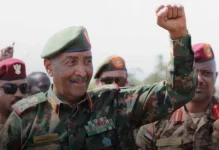Sudan's army leader Abdel Fattah al-Burhan firmly rejected any peace deals with the paramilitary Rapid Support Forces. He shared this message through a video statement on Saturday, promising to destroy the opposing group completely. He stated that they refuse to forgive, compromise, or talk with RSF members at all. Al-Burhan emphasized that his military remains focused on restoring national unity and peace to the country.
He offered one path forward for enemy fighters who truly regret their actions. Those who lay down their weapons might still receive forgiveness, particularly individuals stuck in areas currently held by rebel forces. The army reported major progress earlier that same day, announcing they had taken control of a significant marketplace in Omdurman, the sister city across from Khartoum. RSF forces previously used this location to stage attacks during the devastating war that has lasted over two years.
The Sudanese military also declared victory over the RSF in Khartoum itself, claiming they command most sections of the capital. This ongoing battle between army troops and paramilitary forces has unleashed terrible ethnic violence across the nation. The situation has become what United Nations officials describe as the planet's worst humanitarian emergency, pushing several regions into actual famine conditions. Military officials released a statement explaining that their forces successfully controlled the western Omdurman market called Souq Libya.
They captured weapons and equipment left behind when the RSF members fled. This marketplace stands as one of the biggest and most crucial business centers throughout Sudan. The regular army already dominated most parts of Omdurman, home to two significant military installations. They appear determined to gain full control over the entire capital region, which contains three connected cities - Khartoum, Omdurman, and Bahri - all divided by different branches of the famous Nile River.
The paramilitary RSF has stayed silent about the military advance in Omdurman, though they still maintain control in certain areas there. This deadly conflict erupted because of leadership struggles between both forces right before Sudan planned to transition toward a civilian government. The war destroyed large portions of Khartoum completely. It forced more than twelve million Sudanese people from their homes and created severe hunger problems for about half the country's fifty million residents.
Nobody knows exactly how many people have died during this conflict. Research released last year indicated that around sixty-one thousand deaths occurred just in Khartoum state during the first fourteen months of fighting. The continuing violence has added more problems to an already unstable region. Neighboring countries face their challenges as Libya, Chad, the Central African Republic, and South Sudan have each dealt with internal fighting during recent years.
He offered one path forward for enemy fighters who truly regret their actions. Those who lay down their weapons might still receive forgiveness, particularly individuals stuck in areas currently held by rebel forces. The army reported major progress earlier that same day, announcing they had taken control of a significant marketplace in Omdurman, the sister city across from Khartoum. RSF forces previously used this location to stage attacks during the devastating war that has lasted over two years.
The Sudanese military also declared victory over the RSF in Khartoum itself, claiming they command most sections of the capital. This ongoing battle between army troops and paramilitary forces has unleashed terrible ethnic violence across the nation. The situation has become what United Nations officials describe as the planet's worst humanitarian emergency, pushing several regions into actual famine conditions. Military officials released a statement explaining that their forces successfully controlled the western Omdurman market called Souq Libya.
They captured weapons and equipment left behind when the RSF members fled. This marketplace stands as one of the biggest and most crucial business centers throughout Sudan. The regular army already dominated most parts of Omdurman, home to two significant military installations. They appear determined to gain full control over the entire capital region, which contains three connected cities - Khartoum, Omdurman, and Bahri - all divided by different branches of the famous Nile River.
The paramilitary RSF has stayed silent about the military advance in Omdurman, though they still maintain control in certain areas there. This deadly conflict erupted because of leadership struggles between both forces right before Sudan planned to transition toward a civilian government. The war destroyed large portions of Khartoum completely. It forced more than twelve million Sudanese people from their homes and created severe hunger problems for about half the country's fifty million residents.
Nobody knows exactly how many people have died during this conflict. Research released last year indicated that around sixty-one thousand deaths occurred just in Khartoum state during the first fourteen months of fighting. The continuing violence has added more problems to an already unstable region. Neighboring countries face their challenges as Libya, Chad, the Central African Republic, and South Sudan have each dealt with internal fighting during recent years.












